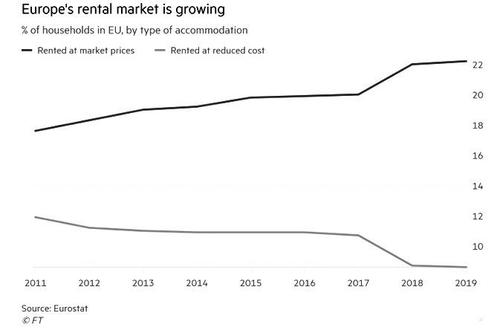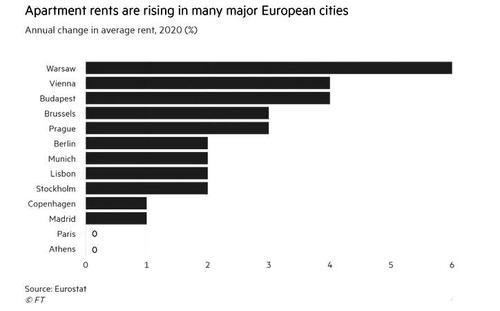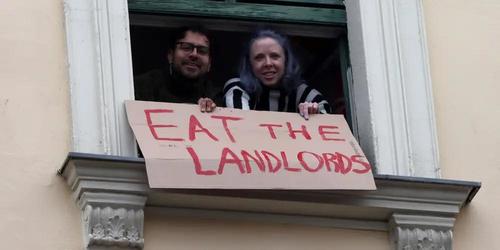In a time when ultra-left progressives, socialists and liberals across the US are quietly gathering in corners and testing the public mood with suggestions that the next logical step in the US transformation to a socialist utopia is expropriation of assets, Germany is actively moving toward seizing (read confiscating) rental properties from corporate landlords to provide housing to provide cheap (or free) housing to the masses, and it has Lorena Jonas to thank for this sharp turn to the left.
Jonas – a generously tattooed “goth” resident of Germany’s capital – has spent the past eight years fighting landlord rent rises in her trendy Berlin district but as the FT reports, her latest battle will affect not just her neighbors but hundreds of thousands of tenants across the city, and potentially impact landlord-tenant relationships across the globe.
Jonas has been involved in a radical campaign urging Berlin’s city government to expropriate 240,000 properties from Germany’s biggest publicly listed residential landlords, accusing them of squeezing out lower income, long-term residents through shoddy maintenance and jacked-up rents.
She is hardly alone: having collected more than 350,000 petition signatures, their proposal which targets corporate landlords with more than 3,000 apartments each, will be voted on in a local referendum in September. Amazingly, polls suggest nearly half of Berliners support expropriation, which would force the companies to sell their properties to the city government at a “fair” price.
Perhaps not too surprising since Berlin was long the capital of the communist version of Germany, it is still a striking observation that half of the population in one of Europe’s most influential cities is planning to do away with private property – maybe not entirely at first, but once you start expropriating apartments under the pretext of “the greater good” you will never stop.
“What does it mean that my flat is now a commodity on the stock market, where the goal is to draw as much profit as possible for shareholders?” said Jonas, who lives in a property in Kreuzberg owned by Berlin’s biggest listed landlord Deutsche Wohnen, the main target of the campaign. “These questions are now resonating across Berlin, and beyond.”
Well, what it means is that apartments exist. If developers knew ahead of time that assets which they invested billions to develop would be taken away on a whim – i.e., socialism – they would never have been built leading to a far more dire result.
Alas, having learned nothing from the tragic lessons of the past, Berliners are pushing on and bracing for a fight with Germany biggest corporate landlords. Although small compared with the vast US publicly listed residential sector, corporate landlords such as DW are on the rise across Europe, as the world’s biggest property investors hunt for the stable income which the rental business can provide. As a result, the market capitalization of Europe’s publicly listed residential property sector has grown from €3.5bn in 2006 to nearly €85bn at the end of July this year, according to the European Public Real Estate Association.
Maybe – just maybe – all these disgruntled renters should take a detour to Frankfurt where the ECB has enabled this unprecedented housing bubble across Europe. But alas, when it comes to figuring out cause and effect, central banks are somehow completely untouchable, as if the broader population has some allergy to conceptualizing what printing money as a business model entails.
In any case, back to Germany where more than half of Germans rent their homes – the second highest rate among OECD countries – and as house prices rise around the world courtesy of central bank bubble-blowing making home ownership less affordable, the ranks of renters are swelling elsewhere too. Across the EU nearly a quarter of households lived in market-priced rented accommodation in 2019, the latest figures available, according to Eurostat.
And so, unable to overhaul a monetary system that is broken at its core, the local are taking the easy if suicidal way out:
“Unless we find some mechanism of continuing to transfer property from landlords to tenants [via home ownership] . . . you get a more unequal society split between the people with equity in housing and those without,” said Yolande Barnes, a professor at University College London’s Bartlett Real Estate Institute.
She is of course describing a core tenet of Marxism. If only she could tell us how every single Marxist experiment in human history has ended.
The good news it so far few cities have proposed measures as radical as those in Berlin’s September ballot. But many face similar problems: companies and entrepreneurs buying up and renovating old properties, then selling off units at lucrative mark-ups.
Then again, that the latest socialist revolution is starting in Berlin is probably not a surprise: once known for anarchist squatters’ communes and freewheeling techno clubs, the city has become an attractive investment. Existing buildings’ rents have shot up by as much as 43% over the past five years, making it increasingly unaffordable for the 86% of Berliners who rent.
Furthermore, nearly 125,000 of the city’s rental units were converted into owner-occupied homes between 2011 and 2020, according to recently published estimates by Berlin’s senate, further shrinking the market, as buyers – their bank accounts swollen thanks to central bank generosity – went on a buying spree. Last year was the biggest yet: 19,310 units vanished from the rental market.
But how is this Marxist proposition even possible in a “western” city? Simple: as the FT explains, the expropriation initiative is based on Article 15 of the German constitution, which says “land, natural resources, and means of production” can be reclaimed for public ownership, in exchange for compensation; of course, it has never before been tested in practice.
The proposal will pass if at least a quarter of eligible voters cast a majority of votes in favor. But even if the activists win, the senate is only politically, not legally, bound to act. And as the clause is untested, it will spark contentious debate as to its constitutionality.
Critics – i.e., non-Marxists – argue that expropriation is divisive, economically nonsensical and potentially illegal.
Tobias Nöfer, board chair at the Berlin-Brandenburg Architectural and Engineering Association, said the city was being divided by an idea he called “political extremism”. But he agreed Berlin needed tougher regulations against speculation, noting that many buildings had been bought by wealthy investors, then left vacant.
“We need discussions around how you deal with public land — do you just sell it to the highest bidder? Because you could end up with an empty and very expensive inner city,” he said.
Naturally, the target of this Marxist campaign, Deutsche Wohnen, said the initiative was counterproductive: “Funds and resources would be tied up for decades in compensation payments and thus lost to the construction of urgently needed housing.” Its rental prices respect city regulations and 82 per cent of tenants it surveyed are satisfied, it said.
Municipal officials estimate compensation payments to landlords would cost about €36bn. Campaigners say between €8bn and €18bn would be fair. Joanna Kusiak, an urban sociologist at Cambridge university who is also a Berlin resident and expropriation campaigner, called it a “unique confrontation”. “This is expropriating financial corporations on a big scale,” she said. “No one’s ever done it before.”
Like a good socialist, Kusiak had a hilariously goalseeked argument to justify Marxism: according to her, expropriation could stimulate the economy, by using rents to fund the construction of more flats. “What we are for is using the income from rents to build more houses, rather than use [it] to build shareholders’ fortunes.”
If only Kusiak understood that without those shareholder “fortunes” being recycled into new investments and capital spending she may well be living in a cave. Meanwhile that other socialist, Barnes, chimed in with the safe warning that a growing rental sector could create a long-term financial burden for governments in the form of housing welfare subsidies for retirees who never managed to get on the housing ladder.
Because what better way to incentivize retirees – and everyone else for that matter – to achieve nothing in their lives than to promise them guaranteed government handouts for life.
To be sure, the expropriation bid is not the first time Berlin has been at the forefront of Europe’s battle to subdue urban rental costs. Last year, the city tried to impose a rent cap but Germany’s highest court mercifully struck it down, arguing such powers lie with the federal government.
While critics ridiculed that attempt as an economically destructive flop, it has spurred a nationwide movement for a federal rent cap.
Always demanding the last word, one Marxist campaigner dargue that viewing housing costs in purely economic terms misses a fundamental point: “Housing is not a luxury,” said Christian, an organiser at Berlin’s Renters Union, who did not want to state his last name due to legal battles with landlords. “It should be a human right — just like access to drinking water, education or health.”
He’s right: housing, education and health used to be human rights in every communist country on earth…. such as the Democratic Republic of Germany. Maybe even Christian remembers how that particular utopia ended.
Alas, they either can’t or they simply won’t, which is why it’s only a matter of time before Germany’s neo-Marxist initiative jumps the Atlantic and arrives in that progressive, proletariat state of the United States, where we would be sweating profusely if we were either Blackstone or Blackrock, where Steve Schwarzman and Larry Fink would make for a very nutritious meal.







